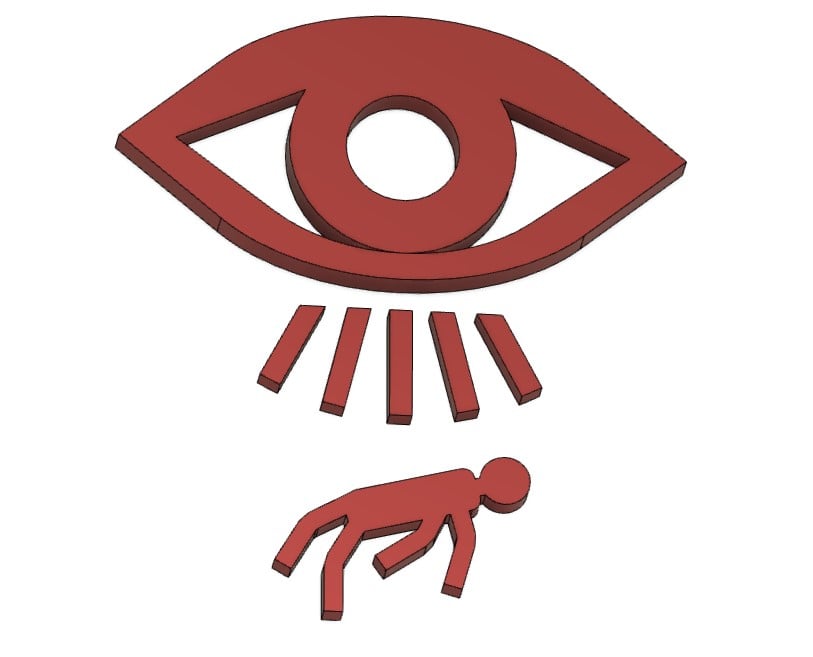Are any scientists out there with the active mission of “disprove god”? I highly doubt that.
I think the point is that science by existing works to disprove the existence of God. For example, Darwin was not trying to disprove the existence of God when he wrote about evolution, but by doing so he supported the case that god does not exist.
tbf i personally believe the adam and eve story is a metaphor
The entire first testament is a metaphor. It blows my mind that anyone can think otherwise.
i was referring to the adam and eve story from the quran (i am muslim), but i will give it a read :}
honestly, a lot of the stories that appear to ‘not make sense’ make much more if you consider the metaphor aspect.
Oh gotchya! Yea each major religion has the same underlying themes at the end of the day.
Twas the original purpose of natural philosophers to find proof of God’s existence.
You can have your faith, so long as you stop forcing it down other people’s throats.
People take this to mean evangelizing, but still don’t see anything wrong with passing laws about their religion’s morality.
Freedom of religion also means freedom from religion. If legal and moral standard of society are dominated by the tenets of one religion, that’s not freedom of religion.
and don’t insist that every part of the holy texts are literally 100% undiluted word of god, which generally makes religion way easier to integrate with a scientific worldview.
no, god did not create eve from adam’s rib, that’s just evocative storytelling initially written by people in the middle east 2000 years ago and repeatedly altered and translated since then.
The problem is, the Abrahamic religions will always seed new fundementalists because, regardless of how people with a modern mindset might interpret it as allegory etc. to make it more palletable, the texts were intended to be read and believed literally. They were written by people in the bronze age, based on made up stories that go who knows how far back.
It’s what makes them so toxic, the belief virus of fundementalism is always there in a latent state waiting to be activated by some new context (usually a particularly charismatic leader or radical change in society).
You see a great example with the current pope – people thought from his language of “acceptance” towards lgbt people that the church was becoming more progressive, but then recently you see him using slurs that pretty clearly contradict that sentiment, because he understands the text is unequivocally anti-lgbt. The Abrahamic religions will always betray people in this way.
Created and shared on devices created by science contribution…
A motivatonal meme? Shit did i just mess up the timeline?
Science doesn’t prove anything. It disproves things until only a single theory remains.
…single
theoryhypothesis remains.A hypothesis is an observation stated in a falsifiable fashion, which allows it to be tested. Once a hypothesis has been tested thousands of times and always generates the same outcome, then it can become a theory.
Nonetheless, you know whats up, science proving shit only happens when the stars align. But disproving shit is super valuable as it allows researchers to reassess the hypothesis and experimental design in hopes of proving shit sooner rather than later.
It doesn’t really disprove things either, but can be used to eliminate specific claims as not supported by evidence.
… yet.
Straw man. Science doesn’t try to prove if God is real or fake.
Also, its literally impossible to prove, that something doesntvexist. You can be very sure about the not existence of something, but you can’t be 100% sure.
Are you 100% sure that such proof doesn’t exist?
True it just keeps invalidating the garbage piled up around someones faith. They could accept it was false and move on with no hindrance to their belief in god but because they can’t burn someone as a witch because we know why milk goes bad they reject it all.
I’ve met a lot of people who don’t seem to understand this important concept from epistemology, which is the philosophy of knowledge.
To demonstrate the concept of “non-falsifiability” I will now produce a short fictitious dialog between a made up Scientist, S, and a Religionist, R.
Topic: how old is the earth? Is it 6,000 years old or more than 4 billion years old?
S: The earth must be more than 4 billion years old, because I found these rocks. These rocks have isotopes in them and they definitely look like they’ve been around for more than 4 billion years. If the rocks are really old, then the earth must be really old too.
R: No. The is only 6,000 years old, because the holy Bible has a list of human descendants from Adam, the first man, to Jesus, who we know was born in 4 BC. If you count it all up, you can find the exact year that the earth was created, as described in Genesis 1, and it’s about 6,000 years.
S: But these rocks… They’re really old…
R: God must have created those rocks with the isotopes already set up in the correct ratios to look like they are 4 billion years old, when He separated the firmament from the heavens 6,000 years ago.
S: But how could God create rocks with different isotopes? When minerals solidify from molten lava, lead isotopes naturally form in this ratio. (I don’t actually know how initial lead composition was established for this)
R: God is omnipotent! Any miracle is within his grasp.
S: But why would God want to make the earth appear to be much older than it really is? What purpose does it serve?
R: I do not pretend to understand the ways of God.
One of my favorite quotes from Blood Meridian:
God dont lie. No, said the judge. He does not. And these are his words. He held up a chunk of rock. He speaks in stones and trees, the bones of things.
As an aside, it’s worth noting not every religion conflicts with science.
I don’t remember any scientists raping children then being shielded by the scientific community
And I don’t wanna talk to a scientist
Y’all motherfuckers lying, and getting me pissed
Fuckin’ magnets. How do they work?
What is a Juggalo?
Faith based and ignorance pilled
Biblecore
But unironically, “having faith” implies that you do not need proof but you are trusting your belief. So they are kind of correct
Yep, bible has a lot of sections about having the faith of a child. Believing without needing proof.
The way faith is treated in the First Century doesn’t translate well to modern audiences. Having faith of a child isn’t an analogy to a child being gullible. It’s an analogy to the way a child trusts in and depends on his parents. Trust, arguably, would be a better translation than faith in many instances.
Faith for ancient religious peoples wasn’t about believing without proof. That would be as ridiculous for a Firsr Century jew as it is for us. Faith is being persuaded to a conclusion by the evidence.
Those are apologetics. There’s no point in time where faith has ever required proof or evidence. Trust is not a better translation. Trust can be broken between two people and requires a mutual exchange of equals. That is not what religion is. It is not two equal parties exchanging trust. It’s one party with all the perceived power telling the other how it’s going to be without being able to change the rules, disagree, doubt, etc. It requires total and complete faith to accept. Not trust. Faith.
So while what you wrote sounds nice, it’s all bullshit.
No, sorry. I try to be deferential when talking about this stuff, but this is pretty cut and dry, and I’m afraid you’re just wrong here. This is Greek–not theology. πίστις is the word we’re talking about. It shares the common root with πείθω–“to persuade” (i.e., that evidence is compelling or trustworthy). πίστις is the same word you would use in describing the veracity of a tribunal’s judgment (for example, “I have πίστις that the jurors in NY got the verdict right/wrong”). The Greeks used the word to personify honesty, trust, and persuasiveness prior to the existence of Christianity (although someone who knows Attic or is better versed in Greek mythology feel free to correct me). The word is inherently tied up with persuasion, confidence, and trust since long before the New Testament. The original audience of the New Testament would have understood the meaning of the word without depending on any prior relation to religion.
Is trust always a better translation? Of course not–and that’s why, you’ll notice, I didn’t say that (and if it were, one would hope that many of the very well educated translators of Bibles would have used it). But I think you can agree that the concept is also difficult for English to handle (since trust in a person, trust in a deity, and trust in a statement are similar but not quite the same thing, and the same goes for belief in a proposition, belief in a person, and belief in an ideal or value, to say nothing of analogous concepts like loyalty and integrity).
The point is that πίστις–faith–absolutely does not mean belief without evidence, and Christianity since its inception has never taught that. English also doesn’t use the word “faith” to imply the absence of evidence, and we don’t need to appeal to another language to understand that. It’s why the phrase “blind faith” exists (and the phrase is generally pejorative in religious circles as well as secular ones).
Now, if you think the evidence that convinces Christians to conclude that Jesus’ followers saw Him after His death is inadequate, that’s perfectly valid and a reasonable criticism of Christianity–and if you want to talk about that, that would be apologetics.
In any event, if you’re going to call something bullshit, you better have a lot of faith in the conclusion you’re drawing. ;)
And there are no ongoing studies, clinical trials, etc regarding the existence or non-existence of god. And of course this IS a “shitpost”.
That’s probably because the current Abrahamic incarnation of god and his attributes are carefully designed to be a non-falsifiable claim.
So the point is actually rendered moot. God is according to the True Believer invisible, intangible, only works in “mysterious ways,” and cannot be observed to have any influence on the universe, nor leaves any evidence of his existence except “faith.” By those metrics, it’s irrelevant whether he exists or not. A hypothetical force that exists but doesn’t affect anything is interchangeable from a functional standpoint from something that doesn’t exist.
See also: Russel’s Teapot.
Putting people’s desire to have their beliefs uncontested on a pedestal was a mistake.
SANTA IS REAL!!! LALALALALA I CAN’T HEAR ANYTHING YOU’RE SAYING!!! LALALALA!!
Victim complex / projection
I’ve never seen science try to take away people’s rights, let alone thoughts.
I’ve seen religion do both, though.
Not true. Scientists say I can’t lick needles I find in the park or stab myself with rusty nails or eat monkey brains scientists keep taking my rights away 😭😭😭
scientists dont tell you not to, the government does. scientists say it’s probably not a good idea, but not that you can’t.
Scientists are more likely to encourage you to do dumb things so they can see the outcomes.
Randall is a genius
Good scientists will just let you know the potential consequences and let you decide what to do.
Take global warming for example…
Eugenics was an awkwardly popular movement not that long ago.
What have
The Romansscientists ever done for us?I had a teacher that taught both religion and chemistry. People who learned about that often made comments about it being weird. But he insisted that both topics are not exclusive to each other. It has been a long time since school but I think his reasoning (if that is the correct word) has been that one is philosophical and the other scientific which are separate worlds. You can’t prove stuff in faith scientifically but neither has religion a place in the " real" world. And, to be completely honest, he was by far one of the best teachers I have ever had.
I had a similar experience when I started my first job as a software developer and the owner / lead engineer, probably the most intelligent person I’ve ever met, told me about how is religious.
I just couldn’t compute, particularly as I’d be radicalised against religion online.
We have had many discussions and it become clear that he had thought more about his faith than I ever could and who was I to judge his position if he isn’t hurting people then he can believe what he likes.
As you said, its a philosophical belief and not that he believes in a being per se, but that there is something deeper to the universe.
There are phylosophy of science, sociology and psycology. They aren’t completely disconnected.
One of my favourite biochemistry tutors at university was also a reverend. We never spoke about the overlap but I’ve read his books since graduating and it’s interesting to see how his faith augments his science and vice versa.
At it’s most basic concept, there’s nothing stopping a God from creating all this and giving us the free will to explore it. It’s the specific doctrine of man made organized religion that contradicts itself and science.
If you really want to upset some people ask “what if god made evolution?”





















